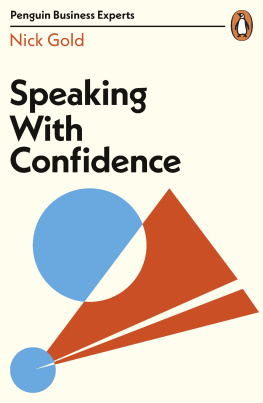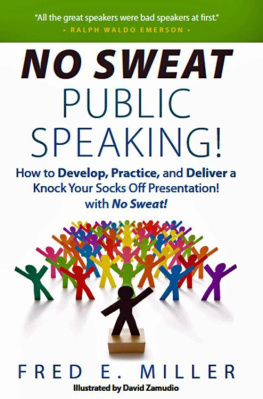Public Speaking for Frankenstein
Learn how to overcome stage fright, build trust, entertain, persuade, and have fun speaking even if you are less than eloquent.
By Arthur Laud
2007 by Andrew Kasch Publishing
All Rights Reserved. No part of this publication may be reproduced in any form or by any means, including scanning, photocopying, or otherwise without prior written permission of the copyright holder.
Disclaimer and Terms of Use: The Author and Publisher have strived to be as accurate and complete as possible in the creation of this book, notwithstanding the fact that they do not warrant or represent at any time that the facts referred to within are accurate due to the rapidly changing nature of the world we live in. While all attempts have been made to verify information provided in this publication, the Author and Publisher assume no responsibility for errors, omissions, or contrary interpretation of the subject matter herein. Any perceived slights of specific persons, peoples, or organizations are unintentional. In practical advice books, like anything else in life, there are no guarantees made. This book is not intended for use as a source of legal, business, accounting or financial advice. The tips and tactics contained herein may not work for you, so pursue them at your own risk. All readers are advised to seek services of competent professionals in legal, business, accounting, and finance field.
Table of Contents
A sk any public speaker and they will be quick to tell you that they had to deal with stage fright in some way or another. There are very few people who get upon the platform and go directly into speaking without being nervous in any way whatsoever. For people that are able to do this, they go on to achieve some kind of fame in the public speaking circuit if they stick with it. For the rest of us, we need to struggle with our own fears and learn how to overcome them, at least to a certain extent, in order to be able to give an effective presentation.
Stage fright can come for any number of reasons. Most of the time, however, stage fright is a direct result of a lack of confidence in our abilities. In order to overcome this lack of confidence we need to know the basics of how to put a good presentation together and then to present it well to a group. Being overly nervous about speaking in front of a group of people will show through in your presentation and will make it much less effective. That is why advance preparation and a well-rounded knowledge of how to be successful as a speaker are essential if you are going to be effective in your speaking abilities.
By the time you finish reading this e-book you will be familiar with not only how to put together an effective presentation, but also the proper steps to take in order to prepare both your mind and body for the stresses of public speaking. Even though this will not help to remove all of the anxieties from you, it will help you to be calm enough that your audience will be able to relax and take in any information that you're giving them. Don't forget that nobody is perfect, including those in the audience that you are speaking to. Once you convince yourself of this, it will make it much easier for you to be able to overcome the initial anxiety and to give a great presentation.
So let's continue on and to begin to learn what it takes to become an effective speaker. In doing so you will gain confidence in many different areas of life, not just in the ability to stand up in front of an audience and speak. Being an effective speaker is something that takes practice and preparation, overcoming an unhealthy fear of public speaking, while maintaining the natural fear that comes out of respect of the situation will help you to be able to convince your audience of whatever you are trying to convey to them. If you are able to control your fear, then you will find that you are able to control the audience as well. When you see this beginning to happen, you may even find that you enjoy speaking in public and look for other opportunities to do so.
It All Starts with Preparation
I f you really think about it, we prepare for almost everything in life. Not only do we prepare for work in the morning but we also prepare for various tasks throughout the day, even some of those that we do every day. If you are about to give a presentation in front of a group of people and you are nervous about it, then you must make sure that you prepare well for the presentation. Depending on the amount of time that you have before the presentation is to be given, you can break down the preparation into several different smaller tasks. By doing this you will be comfortable with the information that you're going to present well in advance of presenting it.
At times it is necessary to speak extemporaneously but that is more of the exception than the rule. Anytime that you are called on to speak in an extemporaneous manner it will generally be about something that you are very familiar with. In most of the cases, however, you will be given plenty of advance notice in order to prepare to speak on the topic in front of an audience. Preparing for a presentation can really be broken down into three major steps, research, compilation and practice. You should begin on your research almost immediately, without procrastinating at all, or else the compilation and practice portions will suffer in one way or another.
Research for your presentation can take any number of forms. Most people do their research by searching on the Internet or looking through similar publications of interest. You should print out any information that you come across that could be used in your presentation so that you are able to highlight the important points to be used. Good research is the foundation of any good speech or presentation and you should use this time to become intimately acquainted with the subject. The more knowledge that you have, the easier it will be to speak on it and to superimpose your confidence in the subject on the listener.
Compilation of the researched information can also take one of several forms. Most new public speakers tend to write out their presentations word for word. Be careful not to fall too quickly into this trap, however, as being too tied to your notes will come across as a lack of personal interest your audience. If you took enough time in the research portion of your preparation then you should be comfortable enough to speak from an outline. Even though you may know exactly what you're going to say, if you use an outline you will be less tied to your notes and will seem much more confident to your listeners.
Next page










